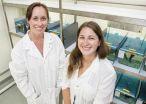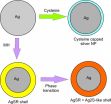(Press-News.org) Screening for a genetic condition in younger people who are diagnosed with bowel cancer would be cost-effective for the NHS and prevent new cases in them and their relatives, new research has concluded.
Researchers at the University of Exeter Medical School were funded by the National Institute for Health Research Health Technology Assessment (NIHR HTA) Programme to assess the effectiveness and cost-effectiveness of screening for Lynch Syndrome. Their findings, published in Health Technology Assessment, indicate that screening the 1,700 people under the age of 50 who are newly diagnosed with bowel cancer in England each year would identify two thirds of these whose cancer was caused by Lynch Syndrome. From this group, the findings suggest that 40 further cases of cancer could be avoided in them and their relatives.
Lynch Syndrome is a condition caused by mutations in the genes responsible for proof-reading DNA. It increases the risk of developing cancer, particularly bowel cancer and cancers of the womb and ovaries. It is responsible for around one in 12 cases of bowel cancer in people aged under 50. Around a third of people with the disease would develop bowel cancer by the time they are 70 if no action is taken. If Lynch Syndrome is identified as the cause of bowel cancer, patients can be offered risk-reducing measures such as more intensive post-operative colonoscopy surveillance to spot recurrences and new cancers early. As close relatives have a 50% chance of having the condition, this testing will help identify them and ensure that they also receive appropriate care
Dr Tristan Snowsill, of the University of Exeter Medical School, said: "This is the first evidence that systematic testing for Lynch syndrome could be cost-effective in the NHS. There are health professionals in the NHS who think cost-effectiveness is the hurdle that needs to be cleared before systematic testing can be implemented; policymakers now have that evidence before them to decide if this is right for the NHS, a decision which will not be solely based on cost-effectiveness."
The team systematically reviewed all the evidence surrounding Lynch Syndrome and bowel cancer, identifying and assessing 42 studies in total, before constructing a computer model of screening strategies for Lynch Syndrome. It found that all screening strategies helped improve health outcomes at a cost generally acceptable to the NHS. The most cost-effective method of identifying Lynch Syndrome involved running tests on the tumour before offering counselling and genetic testing.
In a separate analysis, which has not yet been published or peer-reviewed, the team used the same model to estimate that 28 cancer related deaths (24 from bowel cancer and four from womb cancer) could be prevented each year if Lynch Syndrome screening for people with bowel cancer was introduced.
Dr Ian Frayling, of Cardiff University's Institute of Medical Genetics, was clinical advisor on the research. He said: "This is a very significant piece of work which is much to be welcomed. It justifies the National Health Services in the UK implementing such testing, which is already carried out in other European countries. Those with Lynch Syndrome will now be found and given the care that they warrant, saving time, lives, money and resources. And colleagues around the world are eager to use the model developed by the University of Exeter Medical School, so the benefits extend far beyond the UK."
Deborah Alsina, Chief Executive of Bowel Cancer UK, commented: "We welcome these research findings which demonstrate that lives can be saved through earlier identification of those who are at higher risk of bowel cancer because of genetic conditions like Lynch syndrome. It's critical that more lives are saved by ensuring people gain access to the screening surveillance they need, so that bowel cancer can be ruled out first, not last, in younger patients."
"While bowel cancer is thankfully relatively rare in people under 50, there are still 550 people in this age group who lose their lives to bowel cancer each year and that must change."
INFORMATION:
Genetic test for cancer patients could be cost-effective and prevent further cases
Screening for Lynch syndrome in younger people who are diagnosed with bowel cancer would be cost-effective and prevent new cases in them and their relatives, new research has concluded
2014-09-30
ELSE PRESS RELEASES FROM THIS DATE:
Risky metabolism
2014-09-30
This news release is available in German.
Animals often differ in their behavioural response to risky situations such as exposure to predators. Researchers from the Max Planck Institute for Ornithology now found in a long-term study on different populations of great tits that risk-taking behaviour correlates with both metabolic rate and ambient temperature. High metabolic rates and low temperatures were associated with high risk-taking behaviour, as in these scenarios birds were more likely to approach potential predators.
The readiness to take a risk is to a ...
New blood test determines whether you have or are likely to get cancer
2014-09-30
A new research report published in the October 2014 issue of The FASEB Journal may make the early detection of cancer as easy as a simple blood test. This test, called the "lymphocyte genome sensitivity" (LGS) test, could not only detect some cancers earlier than ever before, but it may eliminate the need for some types of biopsies, as well as identify those more likely to develop cancer in the future.
"The test could allow earlier cancer detection, so helping to save peoples' lives," said Diana Anderson, a researcher involved in the work from the School of Life Sciences ...
Tropical Storm Rachel dwarfed by developing system 90E
2014-09-30
Tropical Storm Rachel is spinning down west of Mexico's Baja California, and another tropical low pressure area developing off the coast of southwestern Mexico dwarfs the tropical storm. NOAA's GOES-West satellite showed the size difference between the two tropical low pressure areas.
NOAA's GOES-West satellite captured an image of the Eastern Pacific Ocean on Sept. 30 at 1200 UTC (8 a.m. EDT). In the infrared image, Tropical Storm Rachel appeared small in comparison to the low pressure area called System 90E, coming together hundreds of miles south. As Rachel spins down ...
Virginia Tech researchers discover potential biomarker to detect 'bubble boy' disorder
2014-09-30
Many people recognize "the bubble boy" as an unusual character from a "Seinfeld" episode or a John Travolta movie.
But in reality, a genetic disease called SCID, short for severe combined immunodeficiency, forces patients to breathe filtered air and avoid human contact because their bodies' natural defenses are too weak to fight germs.
Although it affects fewer than 2,000 new births each year worldwide, SCID is a cousin to acquired immune deficiency syndrome triggered by a human immunodeficiency virus — HIV/AIDS.
Now, using a mouse model, Virginia Tech researchers ...
NASA's TRMM satellite sees Tropical Storm Phanfone fragmented
2014-09-30
The bands of thunderstorms wrapping around Tropical Storm Phanfone in the Northwestern Pacific Ocean appeared fragmented to NASA's TRMM satellite.
On Sept. 30, a typhoon watch remains in effect for the far northern Marianas Islands including Pagan and Alamagan. Tropical storm warnings have been cancelled for Tinian and Saipan, but remain in effect for Pagan, Alamagan and surrounding waters. A flash flood watch remains in effect for the island of Saipan. For updated forecasts for these islands, visit the U.S. National Weather Service Office's Guam website: http://www.prh.noaa.gov/guam/cyclone.php.
On ...
A heartbeat away? Hybrid 'patch' could replace transplants
2014-09-30
Because heart cells cannot multiply and cardiac muscles contain few stem cells, heart tissue is unable to repair itself after a heart attack. Now Tel Aviv University researchers are literally setting a new gold standard in cardiac tissue engineering.
Dr. Tal Dvir and his graduate student Michal Shevach of TAU's Department of Biotechnology, Department of Materials Science and Engineering, and Center for Nanoscience and Nanotechnology, have been developing sophisticated micro- and nanotechnological tools — ranging in size from one millionth to one billionth of a meter — ...
In stickleback fish, dads influence offspring behavior and gene expression
2014-09-30
CHAMPAIGN, Ill. — Researchers report that some stickleback fish fathers can have long-term effects on the behavior of their offspring: The most attentive fish dads cause their offspring to behave in a way that makes them less susceptible to predators. These behavioral changes are accompanied by changes in gene expression, the researchers report.
The findings appear in the Proceedings of the Royal Society B: Biological Sciences.
"There is lots of evidence that moms are very important for their offspring," said University of Illinois animal biology professor Alison Bell, ...
How career dreams are born
2014-09-30
COLUMBUS, Ohio – A new study shows just what it takes to convince a person that she is qualified to achieve the career of her dreams.
Researchers found that it's not enough to tell people they have the skills or the grades to make their goal a reality.
Instead, many people need a more vivid and detailed description of just how pursuing their dream career will help make them successful.
This is especially important for people who have the skills and potential to pursue a particular career, but lack the self-confidence, said Patrick Carroll, author of the study and ...
Chemical interactions between silver nanoparticles and thiols: A comparison of mercaptohexanol again
2014-09-30
Silver nanoparticles are well known for their anti-bacteria properties[1-4]. One of the main routes by which they may act as an anti-bacteria agent, is through attaching themselves to the thiol group present on the cellular membrane surface and hence disrupting the membrane's function[5]. Hence, it is crucial to gain a greater understanding of this complex silver-thiol interaction to determine silver nanoparticles' role in biological systems. With thiols, silver nanoparticles have been proposed to form various types of compounds with different structures[6-8]. One of the ...
Gender equality leads to more Olympic medals for men and women
2014-09-30
Gender equality boosts a country's Olympic medal count for both women and men, shows a new study from the University of British Columbia.
Drawing data from the World Economic Forum's 2013 Global Gender Gap Report, researchers compared a country's tendency toward sexual equality with its medal counts from the London 2012 Olympic Games and the Sochi 2014 Olympic Winter Games.
Countries with greater parity – particularly for measures of educational equality – had more women and men reach the podium.
"Our study makes apparent that gender equality has a tendency to lift ...
LAST 30 PRESS RELEASES:
Unraveling the mystery of why some cancer treatments stop working
From polls to public policy: how artificial intelligence is distorting online research
Climate policy must consider cross-border pollution “exchanges” to address inequality and achieve health benefits, research finds
What drives a mysterious sodium pump?
Study reveals new cellular mechanisms that allow the most common chronic cardiac arrhythmia to persist in the heart
Scientists discover new gatekeeper cell in the brain
High blood pressure: trained laypeople improve healthcare in rural Africa
Pitt research reveals protective key that may curb insulin-resistance and prevent diabetes
Queen Mary research results in changes to NHS guidelines
Sleep‑aligned fasting improves key heart and blood‑sugar markers
Releasing pollack at depth could benefit their long-term survival, study suggests
Addictive digital habits in early adolescence linked to mental health struggles, study finds
As tropical fish move north, UT San Antonio researcher tracks climate threats to Texas waterways
Rich medieval Danes bought graves ‘closer to God’ despite leprosy stigma, archaeologists find
Brexpiprazole as an adjunct therapy for cognitive dysfunction in schizophrenia
Applications of endovascular brain–computer interface in patients with Alzheimer's disease
Path Planning Transformers supervised by IRRT*-RRMS for multi-mobile robots
Nurses can deliver hospital care just as well as doctors
From surface to depth: 3D imaging traces vascular amyloid spread in the human brain
Breathing tube insertion before hospital admission for major trauma saves lives
Unseen planet or brown dwarf may have hidden 'rare' fading star
Study: Discontinuing antidepressants in pregnancy nearly doubles risk of mental health emergencies
Bipartisan members of congress relaunch Congressional Peripheral Artery Disease (PAD) Caucus with event that brings together lawmakers, medical experts, and patient advocates to address critical gap i
Antibody-drug conjugate achieves high response rates as frontline treatment in aggressive, rare blood cancer
Retina-inspired cascaded van der Waals heterostructures for photoelectric-ion neuromorphic computing
Seashells and coconut char: A coastal recipe for super-compost
Feeding biochar to cattle may help lock carbon in soil and cut agricultural emissions
Researchers identify best strategies to cut air pollution and improve fertilizer quality during composting
International research team solves mystery behind rare clotting after adenoviral vaccines or natural adenovirus infection
The most common causes of maternal death may surprise you
[Press-News.org] Genetic test for cancer patients could be cost-effective and prevent further casesScreening for Lynch syndrome in younger people who are diagnosed with bowel cancer would be cost-effective and prevent new cases in them and their relatives, new research has concluded





